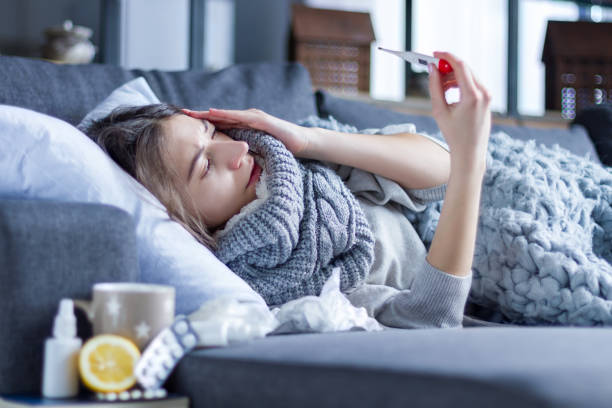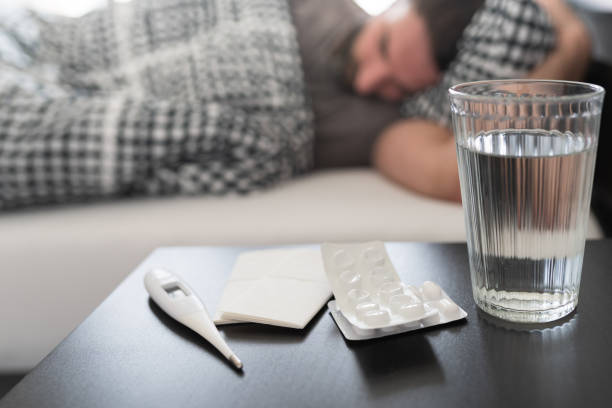You may be having night sweats after working out for a variety of reasons. In most cases, hormonal problems, thyroid problems, or even overtraining are to blame for night sweats after a workout. To rule out serious issues, it is always a good idea to speak with your doctor.
Table of Contents
What Are Night Sweats?
It can be a sign of night sweats if you wake up at night drenched in sweat and it is not because your bedroom is too hot or you have too many blankets on.
Night sweats are characterized by frequent episodes of heavy perspiration while you sleep, according to the Cleveland Clinic. You might perspire so much that your clothes, bedding, and linens are completely soaked.
Depending on the cause of the night sweats, there may be skin flushing, chills, and a rapid heartbeat.
Numerous medical conditions, including hyperthyroidism, panic disorder, bacterial infections, viral illnesses like the flu, diabetes and other hormonal disorders, gastroesophageal reflux disease (GERD), leukemia, lymphoma, benign hyperhidrosis, and infectious diseases like tuberculosis and HIV, can all cause night sweats.
Can You Get Night Sweats from Running?
Yes, running or working out can cause night sweats, to put it succinctly.
Therefore, rest assured that exercise has the potential to cause night sweats as well before you start worrying about all the medical conditions that can cause them.
How can you tell if your night sweats are a result of running or if you have an illness of some kind?
The first thing to think about is when and how they first began. There’s a good chance your workout routine is to blame for your night sweats if they start right after you make a change to your training, such as increasing your volume or intensity or changing the time of day you run.
On the other hand, it’s a good idea to see your doctor for a more thorough workup if your night sweats are accompanied by additional signs of illness, such as fevers, general malaise, loss of appetite, weight loss, and swollen lymph nodes.
In addition to hot flashes, menopausal women may also experience night sweats as a result of the decline in estrogen, which is thought to raise body temperature and cause quick temperature changes.

Causes of Night Sweats from Running
Increasing Intensity
Night sweats following a run can be brought on by abrupt increases in your exercise intensity.
High-intensity exercise can rev up your metabolism even after the workout is over. Examples include HIIT workouts, challenging track workouts at high speeds, hills, and races.
Excess post-exercise consumption (EPOC), also known as the “after-burn,” is the term used to describe the metabolic increase that occurs after a strenuous workout. This metabolic increase is brought on by the body’s increased effort to repair the harm caused by your workout, replenish glycogen stores, and return to homeostasis.
Although your body temperature typically drops as you get ready for bed to help with grogginess, after engaging in vigorous exercise, your body temperature may rise as a result of revving your metabolism.
Evening Workouts
Running before bed or in the evening increases your risk of developing night sweats.
In addition to the metabolic boost that comes from high-intensity exercise, if your workout was too close to bedtime, you might even experience night sweats after running.
Body temperature rises during physical activity, and it may take some time before it returns to its baseline level and begins to dip as it does when you are sleeping.
This is particularly true if you run in the heat, completed a lengthy or difficult workout, or consumed hot beverages or foods right before bed after your run.
Increasing Your Training Volume
Ramping up your volume can lead to night sweats from running, just as increasing your training intensity can.
Your thyroid may release more hormones that increase your metabolism if you run a lot more or if you’ve added other exercises to your training regimen, like strength training or other types of cardio.
Your body temperature rises, as a result, helping to prevent temperature drops while you sleep.
Your own perspiration causes you to wake up damp.
Overtraining
Overtraining, especially when coupled with underfunding, can disrupt your hormonal balance, sending your metabolism haywire
It’s a good idea to look over your training and nutrition to make sure you’re not overdoing it or undereating if you’re suddenly experiencing night sweats while running and have also been feeling pretty exhausted from your workouts.
Eating Late
There’s a higher chance that you’ll experience night sweats if you run late and then do a good job of refueling after your workout.
A protein-rich snack or food that requires some effort to digest and break down increases your metabolic rate, even more, when you eat.
Eating just before bed can raise your body temperature even more when combined with the metabolic overdrive brought on by running itself.
Low Blood Sugar
However, night sweats can also be brought on by hypoglycemia (low blood sugar). Therefore, if you don’t eat for several hours before bed, your blood sugar may drop too much overnight.
You may want to talk to your doctor to have your fasting blood sugar levels and hemoglobin A1C checked if you have concerns about hypoglycemia despite eating well and frequently.

Tips to Reduce Night Sweats from Exercise
Exercise Earlier
Running too close to bedtime means that your body temperature will be higher before going to sleep and that your metabolism will still be active.
See if you can run earlier in the day by rearranging your schedule you can.
Make an effort to finish your workout at least 3 to 4 hours before going to bed.
Do a Cooldown
If you exercise in the evening, be sure to do a thorough cool down to aid in recovery and return your body to normal.
While your core temperature falls, move around by walking or doing other easy exercises, as well as doing some light stretching.
Chill Your Body
Your body temperature is still elevated at night, which is the main cause of your night sweats when you run.
By taking a cold shower, relaxing in an ice bath, sipping ice water, or consuming frozen foods, you can lower your core body temperature.
This may aid in pre-cooling the body and support natural hormonal processes that lower body temperature prior to sleep.
Don’t Eat So Close to Bedtime
Avoid eating within a two to three-hour window prior to going to bed because eating increases metabolism.
if you plan on eating anything. Try to pick foods that are cold rather than hot.
Try a Magnesium Supplement
Magnesium is a necessary mineral for the body and one of the essential electrolytes that runners need to support healthy hydration, nerve function, and muscle contraction and relaxation.
For runners, magnesium has many advantages, including bettering sleep and easing cramps.
Magnesium supplements have been shown in studies to lessen the frequency of hot flashes related to menopause; therefore, they may help prevent night sweats brought on by hormonal changes brought on by exercise.
You can also forego the supplements and consume foods high in magnesium, such as pumpkin seeds, dark chocolate, white beans, avocados, milk and yogurt, beet greens, almonds, cashews, and dried prunes, to name a few.
Cool Your Bedroom
While your body adjusts to increases in training load or after intense workouts, cooling your bedroom with fans or an air conditioner can help counteract the effects of your elevated body temperature.
For the best sleep, the National Sleep Foundation advises maintaining your bedroom’s temperature between 60 and 67 degrees Fahrenheit (15 and 19 degrees Celsius).
Make Gradual Changes to Your Training
You’re less likely to experience running-related night sweats if you gradually increase the volume and intensity of your workouts.
Your metabolism is typically affected by sharp, sudden changes in such a way that they result in night sweats after running.
Invest in Cooling Bedding
There are some great mattresses, pillows, sheets, and other bedding items made to control your body temperature and keep you cool at night.
For instance, the Serta Arctic Cooling Pillow uses Reactex®, a unique technology, which quickly draws heat away from the surface of the pillow.
As a result, the pillow is 30 times cooler than a typical pillow.
With the additional benefit of plant-based cooling technology, the Beautyrest Black mattress collection offers all the support and motion attenuation you’d expect from a mattress and up to 18% more cooling power for sweat-free sleeping.
Be Patient
The good news is that over time, your body will adjust to changes in training volume and intensity, your thyroid will stop triggering a response that revs up your metabolism, and you’ll be able to sleep through the night without experiencing night sweats as a result of exercise.
Summary
Running-related night sweats or night sweats following exercise are more common than you might think. In addition, night sweats following a run can be unsettling and interfere with what should be a restful night of sleep.
The good news is that night sweats from running are typically not a sign of anything serious if there are no other accompanying symptoms, such as fevers or weight loss.
